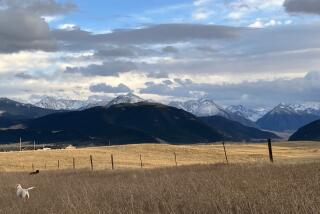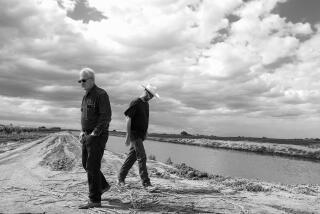Dying Doesn’t Come Easy for Gritty Plains Town : Rural life: Even an offer of free land for families on condition that they move to Antler, N.D., failed to save it.
- Share via
ANTLER, N.D. — Bud Kissner was right about one thing. When the school bell goes silent, it’s a powerful sign that one more small town is in its last stages of life.
He was wrong, though, in thinking that generosity and noble purpose, traits that that guileless man seems to have been born with, would stop the bleeding.
Maybe nothing would. Antler is all too typical of many other once-prosperous family-farm towns withering on the dusty back roads of the Great Plains and across America. It was spawned and then abandoned by the railroad, overlooked by the interstate, elbowed aside by the indifferent shove of agribusiness. The forces grinding them all down are well known.
Not so obvious are accompanying stresses that can lie beneath the surface of a struggling town and fray the nerves, set teeth on edge. That happened in Antler.
Dying does not come easy to these gritty towns. When it does it is a shared loss, as with a family. For Bud Kissner, Antler’s slide toward the void is a personal sorrow.
“I tried,” he said in his melancholy. “At least I tried.”
Does the name seem familiar, Kissner? Harley Kissner? It was in all the papers 10 years ago.
He was the person who gave away land to young families on the condition they move here, stay at least five years, and send their children to school.
The school board had voted that spring in 1981 to shut down the school. They had enough, 23, to stay open that fall, but only 15 projected for 1982, not enough for state per-pupil funds to pay the coal bill, much less the teachers.
Kissner’s answer was simple and direct, prairie style. Sow a new crop of children.
It worked, too, for a time--or gave that appearance anyway. The families came, the school reopened with 41 children and the town of Antler seemed back in business.
That was a facade. Right from the start, in the tents and trailers where the homesteaders camped, in the settled homes of the residents, in the room where the school board met, it was not working at all.
“I don’t know what went wrong,” Kissner was saying the other day. “Maybe I just misjudged people. I really thought it would work.”
The other day, 10 years later, Kissner seemed tired. He’s 82 now, and his blue eyes seem to have lost the flash of hope and sunshine they held that day when he proclaimed a one-man Homestead Act and gave his land away.
He had meant it as a local offer. He placed an ad with his phone number in three North Dakota papers and did not include the area code. But such an improbable gesture was of course news and the word spread across the land.
Letters arrived postmarked from every state. So many phone calls came at once that the Antler switchboard sparked and smoked and fizzled out, which somehow set off the town fire siren. They still talk about it at The Cabin bar.
Kissner selected the seven families he felt most likely to succeed and awarded each a good plot of creek bottom land, 42 acres all told, with sweet well water if you dug for it. Land like that went for about $500 an acre at the time.
Kissner was not a wealthy man. He was a 72-year-old bachelor, no children, a home on a section of land, 640 acres, a few head of cattle and that was all.
As a boy he had worked his father’s sharecrop farm behind a three-horse sulky plow and had gone to a one-room school. When the family moved closer to Antler he went to the Antler school. After high school, in 1930, his father allotted him two acres for his own use. He grew flax and loved the sea-blue beauty of a ripe field of it. He sold the flax for $16. He bought a heifer and steer, fattened the steer and sold it, and bred the heifer--the start of a herd of purebred cattle.
No hardship Kissner endured in his youth, or caring for his widowed, bedridden mother through the Great Depression and beyond, was more difficult than the struggle faced by the 1981 homesteaders of Antler Creek.
“Unless you have gone through a North Dakota winter with no job, no income, huddled with your family around a little furnace wondering whether there’s enough propane, wondering how you’re going to feed your children their next meal . . . well,” said Mike Ellis, “you can’t imagine the suffering.”
“The stress on a family can be unendurable,” said his wife, Barbara. “You come to understand what is meant by despair.”
The Ellises, who had seven children when they arrived in Antler--an eighth, Barnaby, born with no electricity in the home; a ninth, Sandra, after a 60-mile drive to the nearest hospital in a car that barely ran--were the only homestead family that did endure.
All the rest left before five years expired and returned their land to Kissner:
The Murrays with their three children, the LaPointes with their six, Navarettes with seven, Prices with five, Bergs with four, and the Engstroms with two. All gone now. Also gone, within two years, were the eight couples and seven children who missed out on the land giveaway but stayed anyhow. In all, 60 newcomers pulled up stakes.
The stress of their struggles had showed itself in disputes that ranged from petty to ugly. One homesteader got in a brawl that ended in a lawsuit. One domestic flare-up ended in an arrest. There were two divorces.
The school closed in 1987.
After that happened, as Kissner had suspected would happen back in ‘81, the grocery store closed, a filling station closed, the Roman Catholic Church closed.
Four more empty shells in a town littered with empty shells: the shells of two banks, the shell of a doctor’s office, a Lutheran church, two livery stables, a mercantile, a playhouse--weather-worn relics of the 1900s, when the railroad spur reached town and Antler numbered 500 people.
The population was down to 100 when the school closed in 1981, grew to 160 during the homesteader years, down to fewer than 75 today.
The grain elevator is still in operation, but is no longer locally owned. The only commercial businesses in Antler today are Glen Tennyson’s garage and Bruce Henderson’s bar and cafe, and Henderson doesn’t live in Antler.
The only reason those two survive is because Antler sits on the Canadian border. Most of their trade comes from Canada, where prices are dramatically higher for gasoline, booze, cigarettes and other items. Henderson has two cash registers, one for Canadian money, one for American.
When Kissner was a boy, kids from both countries went to the Antler school. The area is so far off the beaten track that the boundary was ignored.
There is no possibility that the school bell will ever ring again in Antler.
What the homesteaders saw when they arrived was a placid village 165 miles from the nearest interstate where life moves at the pace of Antler Creek. The creek wanders down from Canada’s Moose Mountains into the United States and then wanders back, describing the rough outline of a moose antler. Wild berries decorate its banks.
What the homesteaders did not see was the ferment boiling beneath the surface.
The decision on the school’s fate had been reached after a fight that so divided the town that some families in Antler are only now beginning to speak to one another again. Close relatives fell out. At one point, some longtime customers boycotted Tennyson’s gas pumps. Even Kissner was unaware of the depth of bitterness.
After the homestead kids filled the empty desks, reopening the school, many native Antlerites nonetheless chose to send their children 20 miles away to Westhope, population 570, where they would send them to high school anyway as they had done since Antler High closed 15 years ago. So it was not the homesteaders’ leaving by itself that forced the 1987 closing.
School closings nowadays are sweeping across North Dakota’s vast prairies like locusts, some years worse than others. The year the Antler school closed so did 23 others. The next year 30 closed; the next, 27; last year, 39.
“In Bottineau County alone,” said school Supt. Dwane Getzlaff, “we’ll be down to five elementary schools and two high schools within three years.” Bottineau, Antler’s county, covers 1,500 square miles, larger than Rhode Island.
“School closings,” Getzlaff says, “almost never are amicable. The whole process becomes emotional. Hard feelings often result.” Just this year, Getzlaff said, the schools at Maxbass and Kramer combined with the one at Newburg to be called Newburg United. “The teachers out there are calling it Newburg Divided. Nobody’s happy.”
In Antler, where large disruptions are so rare that the cyclone of 1911 is still a conversation topic, a threatened school closing followed by the influx of 60 strangers just might cause shock waves. It did.
“They called us ‘boat people,’ names like that,” said Lynn Price. “Not to our face, but we knew about it. Some of the families were on public assistance, and that didn’t sit too well. You could tell we weren’t particularly welcome.”
Price and two other homesteaders wound up on the school board. Outsiders so soon involved in town politics didn’t sit too well.
Price is now custodian at the school in Sherwood. He and another homesteader, Alex Engstrom, were native North Dakotans but, said Price, they were thought of as outsiders anyhow.
On the other hand, Mike and Barbara Ellis, from Utah, made friends readily and speak of numerous kindnesses done them to ease their struggle. Mike quit a steady job; they sold their house on a 90-by-120 foot lot near Salt Lake City, and came to Antler seeking serenity and space to rear their large brood.
Mike is an expert welder. He had his shop on the back of a truck, found work all over the area and gradually built up a respectable trade.
“I went out to them, did work right at their homes, in their fields. I got to know them and they got to know me,” he said. “We never had a bit of trouble.”
After the school closed, the Ellises packed up and left Antler. They now live comfortably but frugally on 40 acres in the countryside close, but not too close, to Minot, a city of 40,000 where school bells and church bells still ring with reassurance. So Antler, 60 miles north, now has no welder.
Ten years ago, Kissner talked about Antler as if talking about a woman. He truly loved that little spot on the planet. He believed it was favored by God.
The only time he left Antler, he recalled back then, was when he went off to a business college in Fargo in 1931. That Christmas he came home and swore never to leave Antler again because he would not be happy anywhere else.
But Kissner now lives in Bottineau. It is 55 miles from Antler over roads that follow the section lines. He has a small apartment there, a few pieces of familiar furniture from his old farmhouse, a drawer full of photos, letters and mementos. He eats his meals at a booth in the bowling alley restaurant.
“Oh, yes,” he said, “I still get to Antler just as often as I can.”
His eyes, the color of flax, grow moist. “I have so many friends there, you know.”
More to Read
Sign up for Essential California
The most important California stories and recommendations in your inbox every morning.
You may occasionally receive promotional content from the Los Angeles Times.













